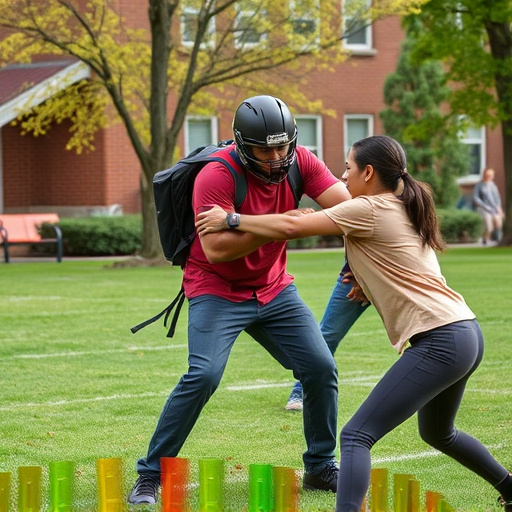College students face unique safety challenges, requiring tailored self-defense training focusing on practical techniques, awareness strategies, de-escalation methods, and digital safety measures. Regular physical training improves fitness and reflexes, while promoting mindfulness and assertiveness enhances overall protection. Institutions offer free workshops, and local law enforcement provides resources, empowering students with both skills and legal knowledge for effective defense while adhering to regional laws.
“Ensuring safety is paramount for college students navigating new environments. This article explores comprehensive self-defense strategies tailored to their unique needs. From understanding the evolving landscape of campus safety, we delve into effective physical training and techniques. Additionally, non-physical strategies and legal considerations equip students with valuable tools for self-protection. By integrating these insights, students can confidently navigate their academic journeys, fostering a sense of security and empowerment.”
Understanding Self-Defense Needs of College Students
College students often face unique challenges when it comes to their personal safety, especially as they navigate new environments and potentially isolated situations late at night. Understanding the specific self-defense needs of this demographic is crucial. Many students live in dormitories or off-campus housing, travel frequently between classes and social events, and may be more susceptible to targeted crimes like theft or even assault due to their lack of experience dealing with such scenarios independently.
Given these factors, self-defense training tailored for college students should focus on practical, efficient techniques that can be easily retained and deployed in real-world situations. The curriculum could include awareness strategies for navigating campus at night, de-escalation methods for potential conflicts, and physical defenses against common attacks, such as grabs or stumbles. Additionally, digital safety measures and the responsible use of personal technology should also be emphasized to protect students from online threats that may indirectly put them in harm’s way.
Physical Training and Techniques for College Students
For college students, self-defense is an essential skill set to learn, especially given the increased focus on personal safety in today’s world. Physical training plays a pivotal role in equipping students with the tools to protect themselves. Regular exercise not only improves overall fitness but also enhances coordination and reflexes—crucial elements in effective self-defense. Incorporating various martial arts forms or specialized self-defense classes can teach students a range of techniques, from basic blocks and strikes to more advanced moves. These skills enable them to respond swiftly and confidently during unexpected situations.
Techniques should focus on practical applications, such as de-escalation strategies, joint manipulation, and pressure points. Students should be trained to recognize potential threats and maintain their composure, allowing them to assess the situation before taking action. Hands-on training in a controlled environment simulates real-life scenarios, fostering better decision-making skills. Moreover, promoting physical fitness through regular exercise boosts students’ overall well-being, making them more resilient and capable of defending themselves effectively.
Non-Physical Strategies for Self-Protection on Campus
For many college students, self-defense isn’t just about physical techniques; it’s also about understanding and employing non-physical strategies to protect themselves while on campus. One crucial aspect is self-defense awareness. Staying vigilant and mindful of your surroundings can deter potential threats before they escalate. Regularly assessing your environment, being conscious of busy routes, and noticing any unusual behavior are essential habits to cultivate.
Another powerful tool in a college student’s arsenal is effective communication. Learning to assert yourself verbally can often defuse tense situations. Clearly and confidently stating your boundaries, using assertive language, and practicing “no” are valuable skills that can help deter aggressive individuals. Additionally, familiarizing yourself with campus security protocols and emergency contact numbers ensures you’re prepared to respond quickly if needed, making non-physical strategies an integral part of a comprehensive self-defense for college students approach.
Legal Considerations and Resources for College Students
When it comes to self-defense for college students, understanding legal considerations is paramount. Many colleges and universities have specific policies regarding personal safety and self-defense classes, so students should first check with their institution’s security or student affairs department. Knowing your rights and the legal framework surrounding self-defense can provide crucial reassurance and guidance in challenging situations.
College students can access various resources to enhance their self-defense knowledge. Many schools offer free workshops and training sessions focused on personal safety, covering basic self-defense techniques and risk assessment strategies. Additionally, local law enforcement agencies often provide valuable information and programs tailored for young adults. These initiatives not only empower students with practical skills but also equip them with the legal knowledge to defend themselves effectively while adhering to regional laws and regulations, making self-defense a viable option for college students’ safety and peace of mind.
